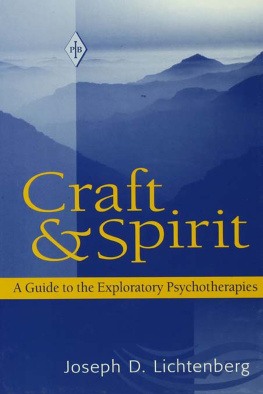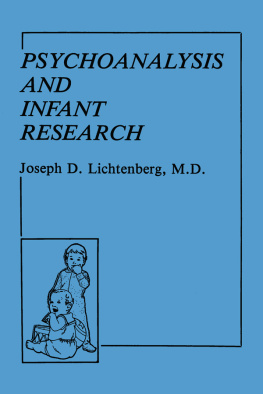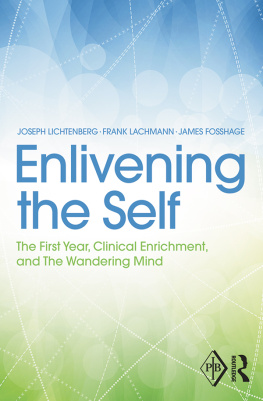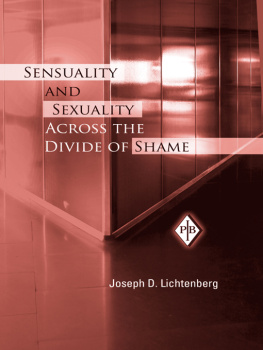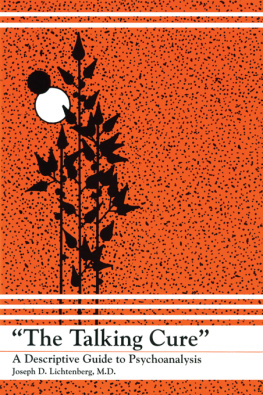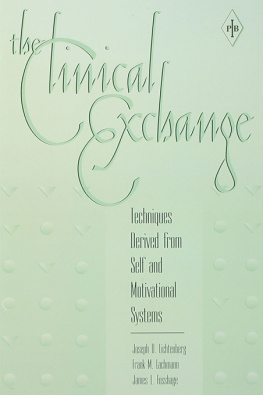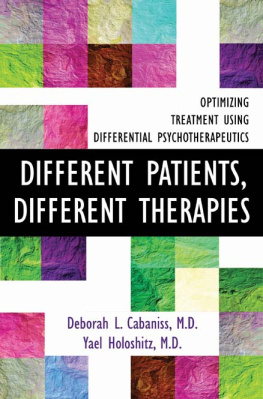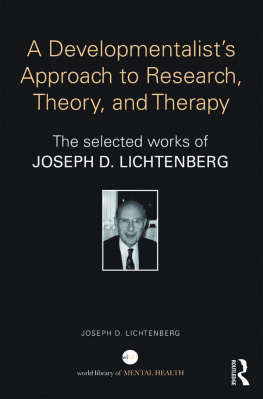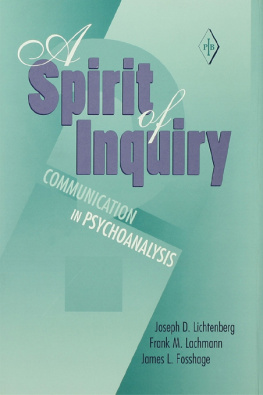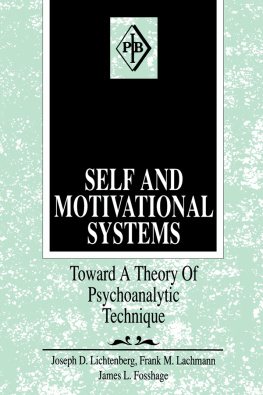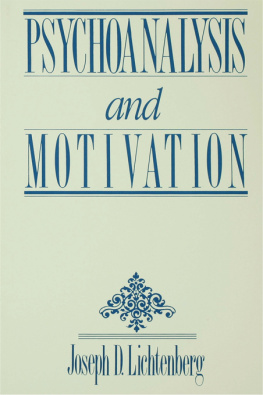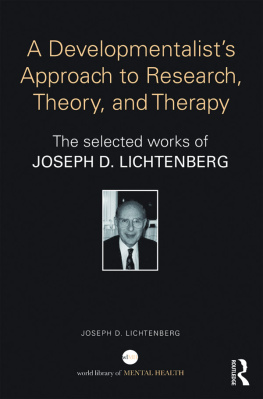Vol. 1: Reflections on Self PsychologyJoseph D. Lichtenberg & Samuel Kaplan (eds.)
Vol. 2: Psychoanalysis and Infant ResearchJoseph D. Lichtenberg
Vol. 4: Structures of Subjectivity: Explorations in Psychoanalytic PhenomenologyGeorge E. Atwood & Robert D. Stolorow
Vol. 7: The Borderline Patient: Emerging Concepts in Diagnosis, Psychodynamics, and Treatment, Vol. 2James S. Grotstein, Marion F. Solomon & Joan A. Lang (eds.)
Vol. 8: Psychoanalytic Treatment: An Intersubjective ApproachRobert D. Stolorow, Bernard Brandchaft & George E. Atwood
Vol. 9: Female Homosexuality: Choice without VolitionElaine V. Siegel
Vol. 10: Psychoanalysis and MotivationJoseph D. Lichtenberg
Vol. 11: Cancer Stories: Creativity and Self RepairEsther Dreifuss Kattan
Vol. 12: Contexts of Being: The Intersubjective Foundations of Psychological LifeRobert D. Stolorow & George E. Atwood
Vol. 13: Self and Motivational Systems: Toward a Theory of Psychoanalytic TechniqueJoseph D. Lichtenberg, Frank M. Lachmann & James L. Fosshage
Vol. 14: Affects as Process: An Inquiry into the Centrality of Affect in Psychological LifeJoseph M. Jones
Vol. 15: Understanding Therapeutic Action: Psychodynamic Concepts of CureLawrence E. Lifson (ed.)
Vol. 16: The Clinical Exchange: Techniques Derived from Self and Motivational SystemsJoseph D. Lichtenberg, Frank M. Lachmann & James L. Fosshage
Vol. 17: Working Intersubjectively: Contextualism in Psychoanalytic PracticeDonna M. Orange, George E. Atwood & Robert D. Stolorow
Vol. 18: Kohut, Loewald, and the Postmoderns: A Comparative Study of Self and RelationshipJudith Guss Teicholz
Vol. 19: A Spirit of Inquiry: Communication in PsychoanalysisJoseph D. Lichtenberg, Frank M. Lachmann & James L. Fosshage
Vol. 20: Craft and Spirit: A Guide to the Exploratory PsychotherapiesJoseph D. Lichtenberg
CRAFT AND SPIRIT
A GUIDE TO THE EXPLORATORY
PSYCHOTHERAPIES
JOSEPH D. LICHTENBERG

2005 by The Analytic Press, Inc., Publishers
All rights reserved. No part of this book may be reproduced
in any formby photostat, microform, retrieval system, or any
other meanswithout the prior written permission of the publisher.
Published by
The Analytic Press, Inc., Publishers
Editorial Offices:
101 West Street
Hillsdale, NJ 07642
www.analyticpress.com
Library of Congress Cataloging-in-Publication Data
Lichtenberg, Joseph D.
Craft and spirit : a guide to the exploratory psychotherapies /
Joseph D. Lichtenberg.
p. cm. (Psychoanalytic inquiry book series; v. 20)
Includes bibliographical references and index.
ISBN 0-88163-433-6
1. Psychoanalysis. 2. Psychotherapy. I. Title. II. Series.
RC504.L525 2005
616.8914-dc22
2005043645
Printed in the United States of America
10 9 8 7 6 5 4 3 2 1
CONTENTS
4 The Message Contains the Message:
Opening Communication to Its Fullest Revelation
6 The Wearing of Attributions: A Guideline for
Therapists to Discover Who They Have Come to Be for
Their Patients
7 Model Scenes: A Guide to Bringing the Theater of the
Mind onto the PatientTherapist Stage
8 How to Respond to a Message that Indicates There Is
Something a Patient Doesnt Want Himself,
His Therapist, or Both to Know
INTRODUCTION
WHAT JUSTIFIES YET ANOTHER BOOK ABOUT techniques for the intensive psychotherapies? And why now? Twenty-five years ago, I wrote The Talking Cure: A Descriptive Guide to Psychoanalysis. That book, like this one, was written to inform not only patients contemplating intensive psychotherapy but also experienced therapists and those in training. My approach was to combine classical analytic theory and technique with new contributions being made by self psychology. What contemporary changes call for a new presentation, a presentation that shifts from analysis as a separate entity, to an inclusive view of exploratory psychotherapies?
Within the field, we have come to an understanding that no rigid boundary separates psychoanalysis from other intensive, investigative psychotherapies. The guidelines for technique I present here are equally applicable to analysis and all other exploratory psychotherapies. The biggest difference between analysis and psychotherapy lies not in the principles of technique used, but in the opportunity provided by the frequency of the sessions and an open-ended mutual commitment. This book is addressed to patients considering intensive psychotherapy or analysis, or who are deciding between them. Similarly, the technique guidelines I propose are directed to therapists practicing psychotherapy, psychoanalysis, or both.
Over the quarter century since The Talking Cure, I have become increasingly convinced that, to a greater extent than had been thought previously, therapists must sense themselves, and be sensed by their patients, as fully and emotionally involved in the treatment. The value once attributed to silence, abstinence, neutrality, and anonymity has been tested and found wanting. The duality of patienttherapist cannot be characterized by the subjectivity of the patient and a presumed objectivity of the therapist, but by two interactive subjectivities. Therapists and analysts must be willing and able, by virtue of their training, to place themselves on stage with their patients to explore the drama that unfolds from the patients experience and problems. Life is lived with people, and therapy cannot be otherwise. A reconsideration of the restrictive approach that followed Freuds papers on technique and informed ego psychology was called for by theorists as diverse as Sullivan, Winnicott, Stone, Bowlby, Rogers, Klein, Greenson, Loewald, Tomkins, Stolorow, and Kohut. Advocating, however, that therapists be more involved, more participant, more on stage, introduces hazards long recognized and feared: intrusiveness, encouraging undesirable dependence, and, worst of all, interfering with the openness to explore that constitutes an investigative psychotherapy. In this book, I present guidelines for technique that are designed to permit and encourage therapists in their greater involvement and transparency while not only preserving but greatly enhancing exploration.
The theoretical foundation for the principles of technique I advocate derives from research on infants and young children. This broadly based research contributes many salient conceptions relevant to my proposals and descriptions. Regulation of emotion, action, and motivation is dyadic (caregiver and infant), intrafamily (fathermotherchild), and via peer-group interactional learning. Communication begins between a verbal caregiver and a nonverbal, presymbolic infant. Subsequently, communicative messages are conveyed both in nonverbal gestures and interactions and in syntactic or metaphoric verbalizations. Stated more simply, dyads, such as therapists and patients, communicate by both spoken and nonverbal interactions. Therefore, in the dyadic realm of an exploratory treatment, two parallel tracks of communication are unfolding: a verbal exchange and an enactive pull to involve one another in roles expressive of the motives and experiences of each participant. Because all communication involves various degrees of verbalization and enactment, no longer can we ask whether therapists should be involved as participants; rather, we must ask how they cannot. A contemporary view of therapy requires guidelines for technique that position therapists optimally to comprehend both verbal and enactive messages.

